College of Human Sciences
Unisa and Egypt join hands to illuminate a shared past
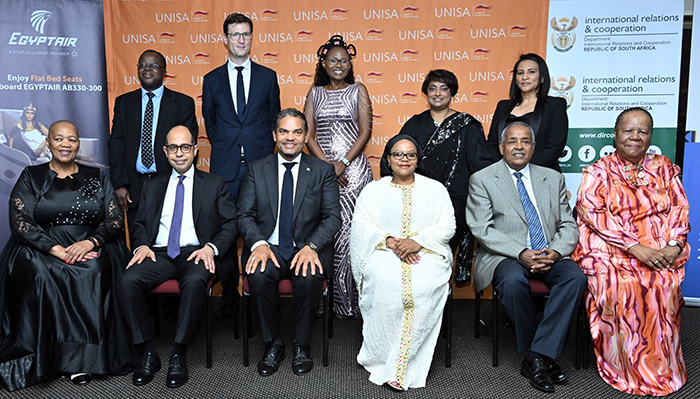
Front row, from left: Prof Zethu Nkosi, HE Ahmad Sharief, Alvin Botes, Dr Matshiliso Molapo, Salih Omar Abdu and Dr Naledi Pandor
Back row, from left: Dr Johnny Pitswane, Prof Thomas Pooley, Dr Thulile Shandu-Phetla, Adv Shireen Said and Roschelle Botes
High-profile dignitaries and Unisans responded positively to an invitation extended by Prof Zethu Nkosi, Executive Dean of the College of Human Sciences, in collaboration with the Embassy of Egypt, through His Excellency Ahmad Sharief, the Ambassador of Egypt to South Africa, to attend a live screening at Unisa’s Muckleneuk Campus of the official opening of the Grand Egyptian Museum (GEM) that took place on 1 November in Cairo.
The event marked a landmark chapter in global cultural, scientific and technological collaboration as dignitaries and guests from several countries gathered to celebrate this historic moment, demonstrating the museum’s international significance.
The welcome and opening address was delivered by Dr Matsheliso Molapo, Acting Vice-Principal: Strategy, Risk and Advisory Services, who set a unifying tone that echoed the joint commitment between the two institutions to express a shared story of ancient civilisation and enduring innovation.
Molapo’s remarks articulated the GEM’s role as a repository and living chronicle of humanity’s intertwined heritage and ancestral history. She also flagged the importance of joint patents, research and circulation of ideas, drawing direct inspiration from Dr Naledi Pandor, Chairperson of the Nelson Mandela Foundation, who called for active scholarly engagement across borders.
The ceremony chronologically traced parallels between the roots of art, science, heritage and technology that originated in Egypt and were renewed through the establishment of the long-awaited museum.
Molapo stated that the GEM is a bridge of knowledge, envisioned as a symbol of unity and educational legacy. She closed her address with the warmly resonant Sotho phrase, "Moeng e tla ka gae re je ka wena", which loosely translates into the extension of a heartfelt welcome and a spirit of hospitality to all dignitaries and guests – an apt sentiment for such a momentous gathering. The phrase also signifies the joint consumption of knowledge and information resulting from the collaborative event.
Distinguished voices and programme highlights
The programme director of the event, Prof Thomas Pooley, Acting Director of Unisa’s Directorate: Music, referenced the art journey through the ages in African kingdoms, which was cast through musical expressions. Dr Thulile Pearl Shandu-Phetla, Chair of the Department of English Studies, in welcoming Sharief to the podium, outlined the worth of the GEM to the world and to all humankind.
"The GEM is the world's largest museum of its kind," said Sharief at the commencement of his address. "Beyond being a suite of galleries, it is a scientific complex for research, conservation and education. It houses 100 000 artefacts, including the Tutankhamun Collection, which is now complete for the first time."
Sharief extended a warm invitation to South Africans to visit Egypt, including students, scholars and artists who would like to explore the origins of art, science and culture, as well as those interested in a world-class experience.
He then acknowledged Unisa’s generous partnership and introduced Alvin Botes, Deputy Minister of International Relations and Cooperation, who delivered the keynote address.
In his keynote, Botes referenced the Freedom Charter and the pivotal role of ZK Matthews as a signatory, celebrating Africa’s unified voice and commemorating the continent’s role as the cradle of civilisation, from prehistory to a technologically advanced present. He also noted the challenges of multidimensional crises, ranging from mineral politics to ever-shifting geopolitics, while celebrating the triumphs of African civilisations throughout history.
Botes emphasised the GEM’s unique purpose as a centre for scientific and technological research and as a platform for knowledge exchange. He poignantly linked the significance of the Nile River, long revered for its sacred power, to principles of truth, the Ubuntu spirit and an enduring invitation for ongoing research partnerships.
"Africa speaks in one voice, the voice of memory, the voice of pride and of an awakening of Africa," said Botes. He further indicated that the inauguration of the GEM is "a declaration that Africa will no longer whisper its history to others, but will say it properly in its own mother tongue". In his speech, Botes emphasised partnership more than collaboration and reinforced the depth of commitment to both Africa’s past and its future.
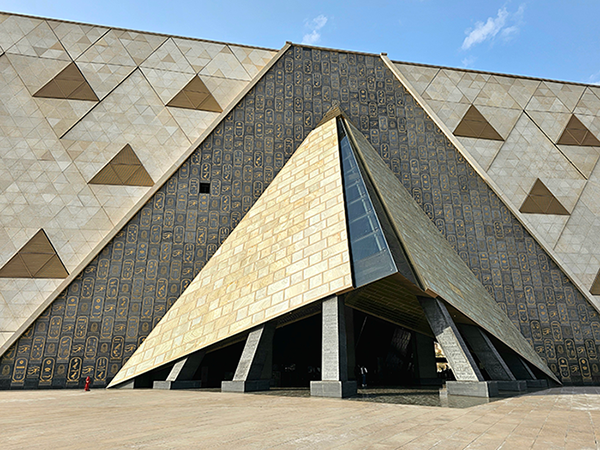
The main gate of the Grand Egyptian Museum (Image credit: Wikipedia)
A live link to Egypt and the world
The highlight of the programme was the live streaming of the official GEM opening in Egypt, attended by Abdel Fattah El-Sisi, President of Egypt, and global luminaries from the seven continents. The event featured historical narratives, live performances and fireworks displays that brought Egyptian heritage vividly to life for an international audience.
In his address, President El-Sisi presented a living story of civilisation, a new chapter and a testimony in the service of humanity that transcends relics alone. In conclusion, he said that the GEM is a platform for dialogue, a destination for knowledge and a hub for humanity.
The bridge of time, heritage, archives and art
The ceremony drew powerful analogies between the figures of Isis and Osiris, the grandeur of the ancient pyramids, and the foundational ideals upon which the GEM is built. As a cradle of cultures, the event’s theme proclaimed, "Our peace today is the civilisation of tomorrow", encapsulating the enduring mission of the museum.
The event concluded with Pooley leading a vote of thanks, acknowledging Unisa Principal and Vice-Chancellor, Prof Puleng LenkaBula, and the entire team for embracing collaboration and advancing the collective dream at Unisa’s own grounds.
* By Brian Katlego Pilane (College of Human Sciences) and Dr Daniel Rankadi Mosako (Acting Chair of the Department of Art and Music)
Publish date: 2025-11-06 00:00:00.0


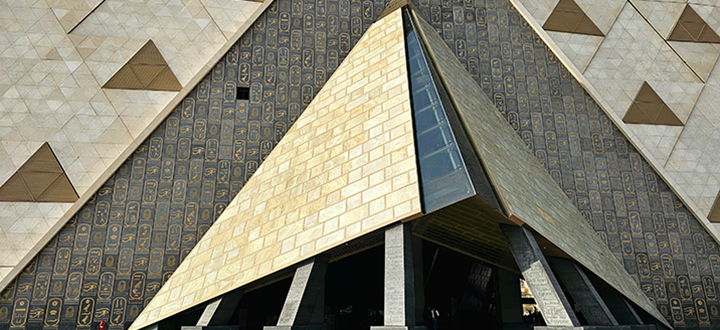 Unisa and Egypt join hands to illuminate a shared past
Unisa and Egypt join hands to illuminate a shared past
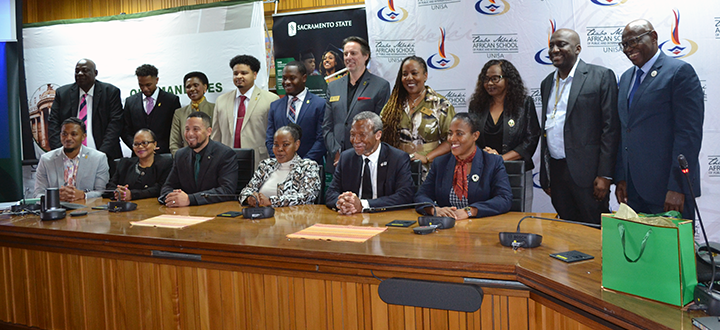 Advancing academic excellence through global collaboration
Advancing academic excellence through global collaboration
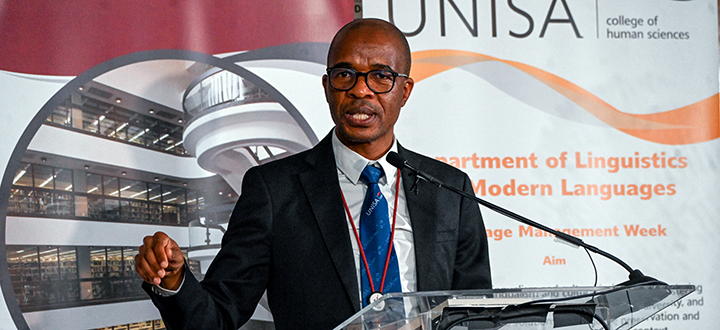 Unisa celebrates African wisdom with groundbreaking multilingual proverbs book
Unisa celebrates African wisdom with groundbreaking multilingual proverbs book
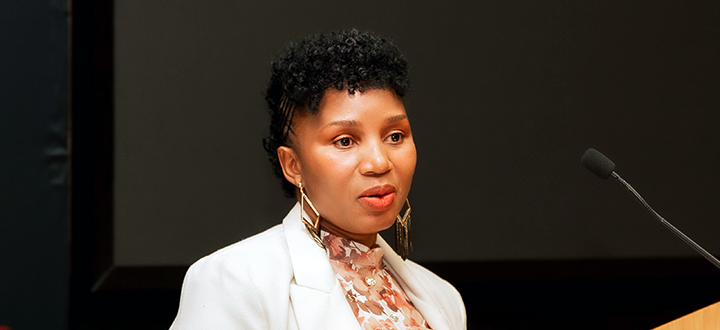 Wings of opportunity: Bringing drones into the classroom
Wings of opportunity: Bringing drones into the classroom
 Visionary youth champion to address Unisa’s Innovation Festival
Visionary youth champion to address Unisa’s Innovation Festival